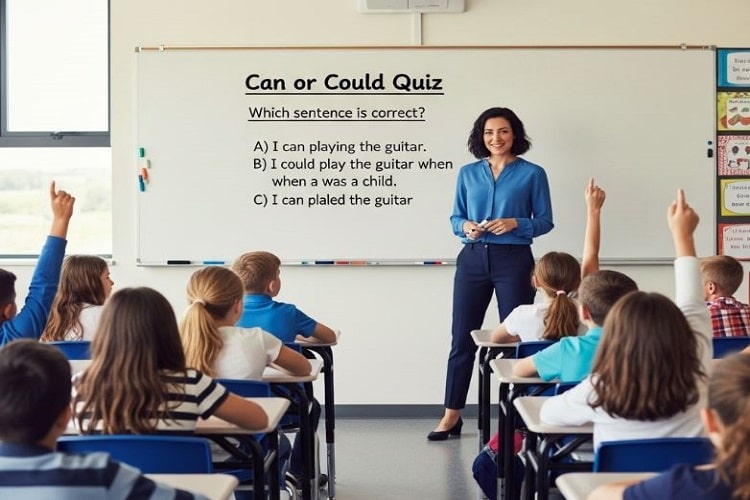The words “can” and “could” might look similar, but they play different roles in English grammar. You’ll give here the can or could quiz part-2 test. But, before giving the test you have to give the can or could quiz part-1 then You’ll be clear your concept about can vs could. Both are modal verbs used to talk about ability, possibility, and permission—but knowing when to use each one can make your English sound more natural and correct.
- “Can” is often used for present or general abilities and permissions. Example: I can swim.
- “Could” is used for past abilities, polite requests, and hypothetical situations. Example: I could swim when I was younger.
If you’ve ever wondered whether to use can or could in a sentence, this interactive quiz will help sharpen your skills. Below, you’ll find 10 multiple-choice questions to test your knowledge, followed by clear answers and explanations.
Can or Could Quiz Part-2
Don’t miss knowing another quizzes: would Quiz
Examples and Exercises of Can or Could Quiz part-2
1. Which sentence is correct?
A) I can playing the guitar.
B) I could play the guitar when I was a child.
C) I can played the guitar.
2. Choose the correct sentence for present ability.
A) She can speak three languages fluently.
B) She could speak three languages fluently.
C) She can spoke three languages fluently.
3. Which sentence shows a polite request?
A) Can you open the window?
B) Could you open the window, please?
C) You could open the window now.
4. Which is correct for asking permission now?
A) Could I borrowing your pen?
B) Could I borrowed your pen?
C) Can I borrow your pen?
5. Which sentence is about a hypothetical situation?
A) I can go to the party tonight.
B) I could go to the party if I finish my work.
C) I can going to the party.
6. Choose the correct past ability sentence.
A) When I was younger, I can run very fast.
B) When I was younger, I could run very fast.
C) When I was younger, I can ran very fast.
7. Which sentence is correct for present possibility?
A) It can rain later.
B) It could rained later.
C) It can raining later.
8. Which sentence is more polite?
A) Can you help me with my homework?
B) Could you help me with my homework?
C) Could you helped me with my homework?
9. In this sentence, which is correct for past permission? When I was in school, I ……. use the computer lab anytime.
A) could
B) can
10. Which sentence is correct for present ability?
A) I could swim very well now.
B) I can swim very well now.
Answers to all quizzes
- B – “Could” is correct for past ability.
- A – “Can” is used for present ability.
- B – “Could” is often more polite than “can” when making requests.
- C – “Can” is used for asking permission in the present.
- B – “Could” expresses possibility under certain conditions.
- B – “Could” is used for abilities in the past.
- A – “Can” is used to express a possible event in the present or future.
- B – “Could” adds politeness to the request.
- A – “Could” is used for past permission.
- B – “Can” is correct for ability in the present.
FAQs About “Can” and “Could”
What’s the main difference between “can” and “could”?
“Can” is used for present or future abilities, possibilities, and permissions, while “could” is used for past abilities, polite requests, hypothetical situations, and uncertain possibilities.
Can “could” be used for the future?
Yes, “could” can describe future possibilities, often in a conditional sense. Example: I could visit you next week if I have time.
Which is more polite—”can” or “could”?
“Could” is generally more polite, especially when making requests or asking for permission.
Can I use “could” instead of “can” in all situations?
No. While “could” can sometimes replace “can,” it often changes the meaning or tense of the sentence.
Last Word
Mastering the use of “can” and “could” will help you sound more fluent, polite, and accurate in English. Remember:
- Use “can” for present/future ability and permission.
- Use “could” for past ability, hypothetical situations, polite requests, and uncertain possibilities.
Keep practicing with quizzes like this one, and soon, you’ll never hesitate over can or could again.

